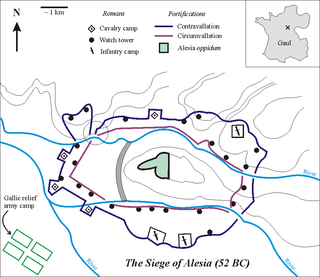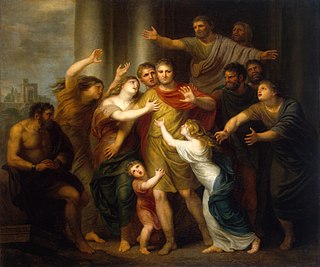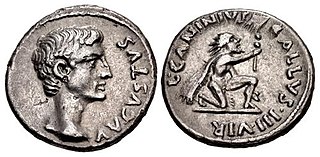Year 48 BC was a year of the pre-Julian Roman calendar. At the time, it was known as the Year of the Consulship of Caesar and Vatia. The denomination 48 BC for this year has been used since the early medieval period, when the Anno Domini calendar era became the prevalent method in Europe for naming years.

Year 52 BC was a year of the pre-Julian Roman calendar. At the time, it was known as the Year of the Consulship of Pompeius and Scipio. The denomination 52 BC for this year has been used since the early medieval period, when the Anno Domini calendar era became the prevalent method in Europe for naming years.
Titus Annius Milo Papianus was a Roman political agitator. The son of Gaius Papius Celsus, he was adopted by his maternal grandfather, Titus Annius Luscus. In 52 BC, he was prosecuted for the murder of Publius Clodius Pulcher. He was unsuccessfully defended by his friend, Marcus Tullius Cicero, in the speech Pro Milone.

The gens Furia, originally written Fusia, and sometimes found as Fouria on coins, was one of the most ancient and noble patrician houses at Rome. Its members held the highest offices of the state throughout the period of the Roman Republic. The first of the Furii to attain the consulship was Sextus Furius Medullinus in 488 BC.

The gens Atilia, sometimes written Atillia, was a plebeian family at ancient Rome, which rose to prominence at the beginning of the fourth century BC. The first member of this gens to attain the consulship was Marcus Atilius Regulus, in 335 BC. The Atilii continued to hold the highest offices of the state throughout the history of the Republic, and well into imperial times.

The (Second) Latin War was a conflict between the Roman Republic and its neighbors, the Latin peoples of ancient Italy. It ended in the dissolution of the Latin League and incorporation of its territory into the Roman sphere of influence, with the Latins gaining partial rights and varying levels of citizenship.

Titus Manlius Imperiosus Torquatus was a famous politician and general of the Roman Republic. He had an outstanding career, being consul three times in 347, 344, and 340 BC, and dictator three times 353, 349, and 320 BC. He was one of the early heroes of the Republic, alongside Cincinnatus, Cornelius Cossus, Furius Camillus, or Valerius Corvus. As a young military tribune, he defeated a giant Gaul in single combat in one of the most famous duels of the Republic, which earned him the cognomen Torquatus after the torque he took from the Gaul's body. He was also known for his moral virtues, especially his severity as he had his own son executed after he had disobeyed his orders in a battle. His life was seen as a model for his descendants, who tried to emulate his heroic deeds, even centuries after his death.
Publius Servilius Vatia Isauricus was a Roman consul elected in 48 BC along with Julius Caesar. He is generally regarded as a puppet of Caesar, having a long friendship with the Dictator.
Marcus Vinicius was a Roman consul and, as husband of Julia Livilla, grandson-in-law (progener) of the emperor Tiberius. He was the son and grandson of two consuls, Publius Vinicius and Marcus Vinicius.
The Via Annia was the Roman road in Venetia in north-eastern Italy. It run on the low plains of the lower River Po and of the lower Veneto and Friuli Venezia Giulia regions, an area which had many rivers and large marsh areas and bordered the coastal lagoons. It linked Atria to Aquileia, passing through Patavium. Then it got to the mainland coast of the Lagoon of Venice near today's Mestre and passed through Altinum. After this, it went through Iulia Concordia, which was further inland. It was paved only through the main towns. The rest was gravelled. It was six to eighteen metre wide. It played an important part in the Romanization of the region.
Marcus Annius Libo was a Roman Senator active in the early second century AD. He was consul in 128 as the colleague of Lucius Nonius Calpurnius Torquatus Asprenas. Libo was the paternal uncle of the Emperor Marcus Aurelius.

The gens Annia was a plebeian family at ancient Rome. Livy mentions a Lucius Annius, praetor of the Roman colony of Setia, in 340 BC, and other Annii are mentioned at Rome during this period. Members of this gens held various positions of authority from the time of the Second Punic War, and Titus Annius Luscus attained the consulship in 153 BC. In the second century AD, the Annii gained the Empire itself; Marcus Aurelius was descended from this family.

The gens Caninia was a plebeian family at ancient Rome during the later Republic. The first member of the gens who obtained any of the curule offices was Gaius Caninius Rebilus, praetor in 171 BC; but the first Caninius who was consul was his namesake, Gaius Caninius Rebilus, in 45 BC.
Titus Cloelius Siculus was a Roman statesman of the early Republic, and one of the first consular tribunes in 444 BC. He was compelled to abdicate after a fault was found during his election. Two years later he was one of the founders of the colony of Ardea.
Marcus Valerius Messalla Rufus, was a Roman senator who was elected consul for 53 BC.
Appius Claudius Pulcher was a Roman politician. An early supporter of Augustus, he was elected consul in 38 BC.
The gens Duronia was a plebeian family at Rome. Although relatively obscure, the family was of sufficient importance to hold a seat in the Roman Senate. Its members are mentioned during the first and second centuries BC.
The gens Tarquitia was a patrician family at ancient Rome. Few members of this gens appear in history, of whom the most illustrious was Lucius Tarquitius Fiaccus, who was magister equitum in 458 BC. Other Tarquitii are mentioned toward the end of the Republic, but were probably plebeians, rather than descendants of the patrician Tarquitii.
Lucius Papirius Mugilanus was a Roman politician and the suffect consul in 444 BC along with Lucius Sempronius Atratinus. The consulship was mostly peaceful, including renewing a treaty with Ardea.
Lucius Sempronius Atratinus was a Roman politician and the suffect consul in 444 BC along with Lucius Papirius Mugillanus. The consulship was mostly peaceful, including renewing treaty with Ardea.






